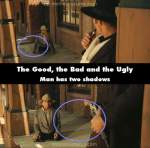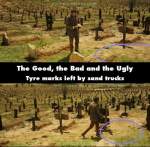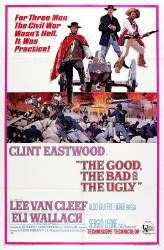
Visible crew/equipment: When Angel Eyes has finished paying the legless man for information, the legless man hops into the saloon. Notice he has two shadows, revealing the presence of stage lighting.

Factual error: Just before Angel Eyes confronts the girl in her room about the whereabouts of Bill Carson, we see her walking in the hall outside her room, and lighting this hallway is a very modern day lightbulb.

Visible crew/equipment: When Angel Eyes sits down at the dinner table in his first scene, there is a small unlit lantern hanging on the wall near his head, and unexplainable light sources reflected on it.
Continuity mistake: When Tuco stops the run away wagon in the desert, Blondie's pistol is not in his waistband. As he walks back to the wagon, it is.
Factual error: The judges reading Tuco and Shorty's death sentences mention them being wanted by so many counties within "the state." This cannot be correct. The battles the characters are near at all times in the film depict the battles over New Mexico. The Union never invaded Texas through its western deserts, despite landing in the Rio Grande valley. New Mexico was not a state until 1912 and was never treated as a state by the CSA. Thus, the judges should be saying territory.
Character mistake: At the confederate prison camp after they are captured a soldier comes up to the sergeant (Van Cleef) and informs him that the "Captain" wants to see him right away. In the next shot with Van Cleef where he is talking to the commanding officer you will see that he is not a captain but a major.
Factual error: The date on Arch Stanton's grave is "3 February 1862," which is how dates are written in most countries. However, in the US, it would be written "February 3, 1862."

Revealing mistake: When Tuco first enters Sad Hill Cemetery, you can see the dual tire track ruts left by the dump truck that brought in the sand to make the grave mounds.
Factual error: The guns Tuco and Blondie use appear to be 1851 Colt Navy because they have octagonal barrels and the loading ram below the barrel. 2 problems are that 1) the '51 was only made in .36 calibre. When shown from the business end the muzzles appear to be much larger. Colt '61 / '60 came in .44 caliber, but they had round barrels. 2) More importantly they are using brass cartridges to load. Conversions for those pistols to load cartridges did not exist till after the war and these were cap 'n' ball only then.
Other mistake: When Blondie is cleaning his pistol he only loaded 3 bullets, but as Tuco's bandits enter the door Blondie shoots off 4 rounds.
Factual error: Regarding the train scenes when Tuco is taken then escapes from Mario Brega, there were no trains / railways in New Mexico in any of the years of the US Civil War, let alone 1862 when Selby's short-lived and daft campaign was limited to. I believe the RRs were starting to move into Texas then, but not NM until the 1870s. Also, the whole geography of the film is wrong if the gold was intercepted but 'escaped' with the three people in the wagon near Glorietta Pass in early 1862. The sequence of events means all involved had to go up and down the Rio Bravo constantly - eg. the 'jornado del muerto' is hundreds of miles from Glorietta. This is too complicated to summarise here, but check the actual battles and timelines.
Continuity mistake: When Tuco pulls the corporal from train they fall down a steep grade. When train runs over the corporal, they're on flat ground. The corporal would be too heavy for Tuco to carry far enough for the ground to flatten out. Watch the ground when the train approaches before the jump.
Factual error: The movie depicts General Sibley's New Mexico campaign. This occurred in the first half of 1862, with the last battle occurring on June 1, prior to a Confederate retreat to Texas. General Sibley is seen, and he lost his battlefield command altogether in 1863. However, Angel Eyes makes reference to Andersonville prison, which did not open until 1864. The question is also begged as to how Arch Stanton, who died in February of 1862, had completely rotted away by May in dry soil.
Other mistake: About 20 minutes into the film, Tuco is arrested by the sheriff who rolls out a Wanted poster which has Tuco's picture. However, as can be seen (but only visible for a second or two), the name on the Wanted poster says Guy Calloway, who was a character in Leone's previous film For A Few Dollars More, who had a bounty on him (and a poster) and was killed by Col. Mortimer early in that film. Leone was notorious for trying to reuse props to save money (the Al Mulock story being the most infamous example), and possibly just reused the old poster with Wallach's picture on it, figuring nobody would notice.
Factual error: Extended version. After finding a dying Bill Carson, Tuco arrives at an outpost looking for a hospital. It's night, or at least dark outside - he is told the hospital is 18 miles away. In the next scene he arrives at the hospital at nearly high noon. A horse canters and gallops (full speed) between 4-30 mph. Basically the hospital was an hour away.






Chosen answer: Tuco knew he had a better chance at survival (and the gold) by playing along with Blondie and keeping his balance on the cross, hoping Blondie does not miss the rope when he shoots. This final, deadly game was preferable to being shot outright by Blondie and dying a poor man.
Scott215
Tuco had no idea that Blondie's intention was to shoot the rope and let him live.